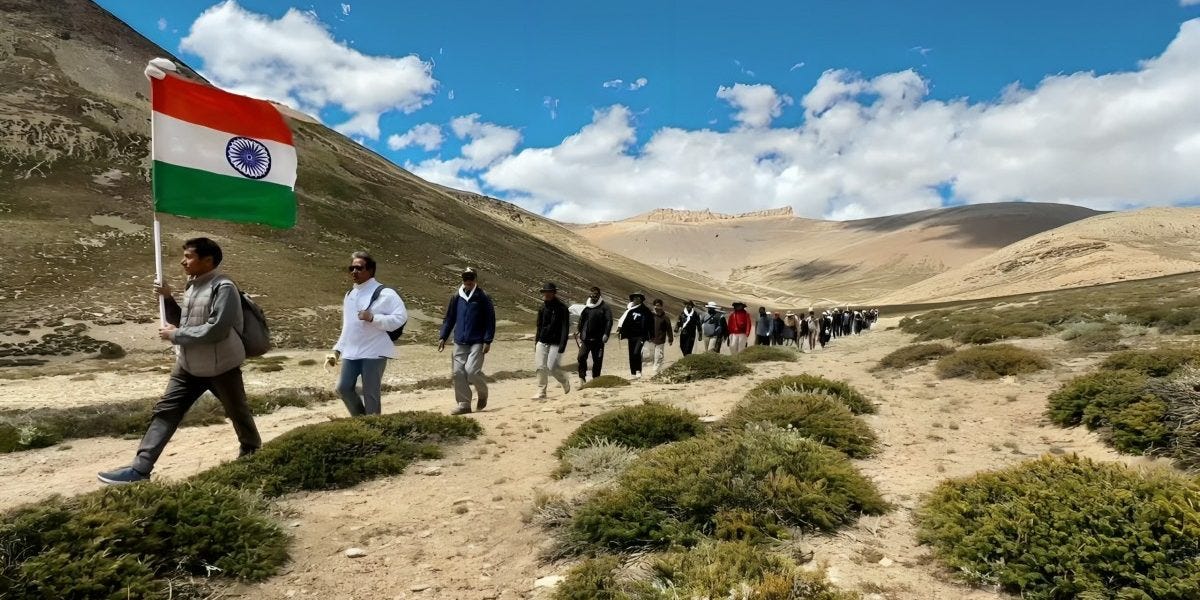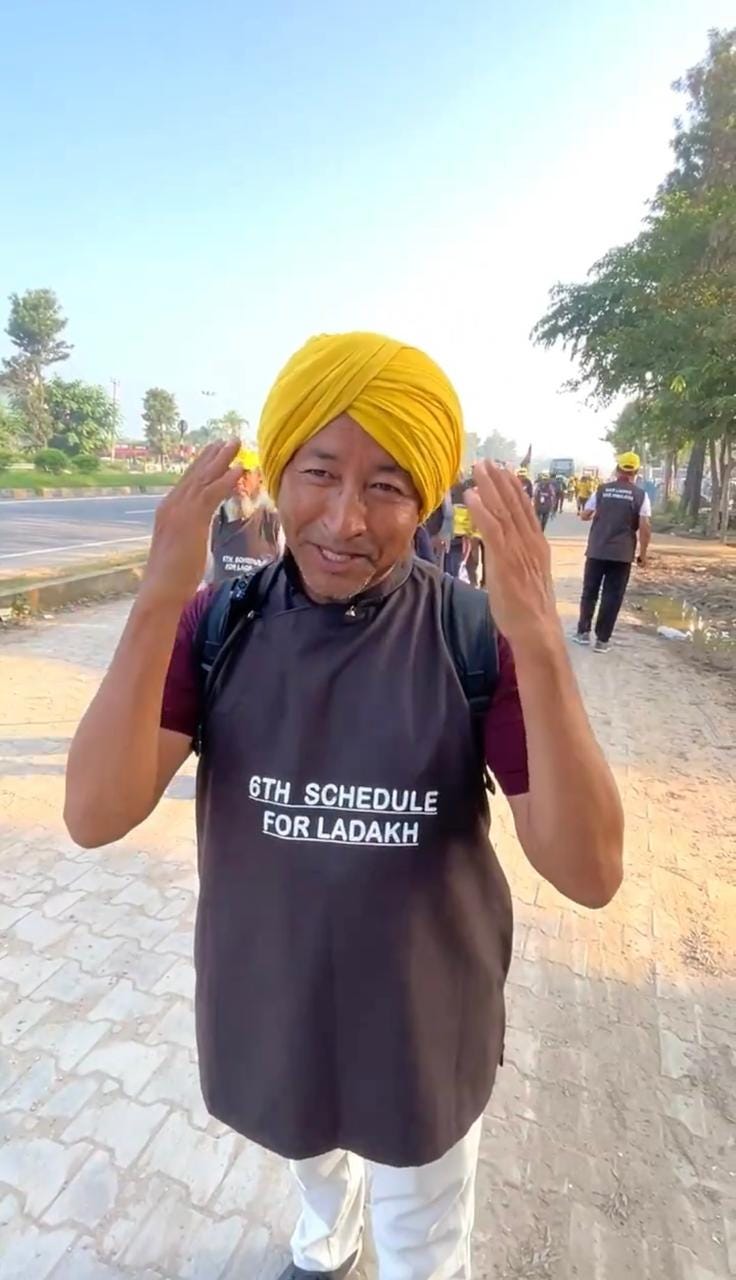Ladakh’s Odyssey for Autonomy: A March to Reclaim Identity and Inclusion
Ladakh’s Quest for Inclusion under the Sixth Schedule: A Peaceful Padayatra to Delhi Led by Environmental Activist Sonam Wangchuk.

From Ladakh to Delhi: A ‘Padayatra’ Led by Sonam Wangchuk
On 1st September 2024, a peaceful march, the ‘Delhi Chalo’ padayatra, was initiated from Leh, Ladakh by renowned environmentalist and innovator Sonam Wangchuk. This odyssey is aimed at drawing national attention to Ladakh’s legitimate demand for inclusion under the Sixth Schedule of the Indian Constitution. Covering a challenging route through the rugged terrains of Himachal Pradesh, the fertile plains of Punjab, and Haryana, the march is set to culminate at Raj Ghat, New Delhi, on 2nd October 2024, coinciding with Gandhi Jayanti. This symbolic unifying march seeks to highlight the long-ignored aspirations of Ladakh’s people, whose unique cultural and environmental identity has often been sidelined in national discourse.
Ladakh’s Historic Overlook and Demand for Inclusion
Ladakh, originally a part of the erstwhile state of Jammu and Kashmir, has felt marginalised and overlooked since Independence. Despite J&K being granted special status under Article 370 of the Constitution, Ladakh received minimal attention in terms of socio-economic development and infrastructure growth. Following the abrogation of Article 370 five years ago, the region was bifurcated into a separate Union Territory, but the socio-political issues of Ladakh remain unresolved. Despite its cultural richness, environmental fragility, and strategic importance, Ladakh has yet to receive the focused development it deserves. Wangchuk’s march is a peaceful yet powerful effort to bring Ladakh’s long-standing and genuine grievances into the national limelight, pressing for constitutional recognition under the Sixth Schedule, which would provide its people greater autonomy and control over their future.
The Demand for Sixth Schedule Status: A Fight for Autonomy
Sonam Wangchuk, alongside Ladakh’s Apex Body (LAB), is advocating for Ladakh’s inclusion under the Sixth Schedule, which grants special administrative autonomy to tribal regions. With over 97% of Ladakh’s population belonging to tribal communities, this demand is not only justified but necessary for preserving the region’s cultural heritage and ensuring its sustainable development. Following the bifurcation of Jammu and Kashmir into Union Territories in 2019, Ladakh’s people were left without adequate local governance structures that cater to their unique needs. The current governance model offers limited autonomy, leaving Ladakhis yearning for more control over their cultural, social, and environmental matters.
Sonam Wangchuk’s Hunger Strike: A Precursor to the March
Sonam Wangchuk’s leadership in this movement is rooted in his unwavering dedication to Ladakh’s cause. Earlier in 2024, he undertook a gruelling 21-day hunger strike, also known as the "climate fast." Enduring harsh winter conditions with sub-zero temperatures, Wangchuk’s protest was an appeal to the Central Government to recognise Ladakh’s need for autonomy under the Sixth Schedule. Surviving on nothing but water and salt, Wangchuk’s fast was a bold statement, highlighting the urgency of protecting Ladakh’s fragile ecosystem and cultural identity. Despite receiving overwhelming support from around 60,000 Ladakhis, the government remained silent, prompting him to continue his advocacy through this peaceful march. His fast ended in March 2024, but Wangchuk made it clear that the struggle for Ladakh’s rights was far from over.
Celebrating India's Diversity: Sonam Wangchuk's Message from Punjab
Today morning, in a heartfelt gesture (video), Sonam Wangchuk, while donning a kesari Sikh turban, endeared himself to the people of Punjab, greeting them with a warm "Sat Sri Akal". Despite battling a chest infection and throat discomfort, Wangchuk's spirit remains high as he continues his mission to highlight the strength of India's unity in diversity. He called for a collective celebration of India's rich cultural tapestry, urging people to view the country not as a collection of impoverished states dependent on central subsidies, but as a union of great nations, each contributing significantly to the whole.
Wangchuk cleverly illustrated his point by drawing comparisons between Indian states and global powers. He reminded his audience that Punjab, in terms of population, surpasses Australia, Haryana is larger than Israel, Maharashtra has a bigger population than Japan, and West Bengal exceeds Germany. Through this, he invited Indians to reimagine the potential of their regions, emphasising that India is not a weak, overpopulated nation, but rather a powerful federation of culturally and economically significant states. This call for pride in India’s diversity resonates deeply, particularly at a time when Ladakh, his own homeland, is seeking greater recognition and autonomy within this vast union.
Understanding the Sixth Schedule of the Indian Constitution
The Sixth Schedule of the Indian Constitution provides for the administration of tribal areas as autonomous entities and is currently applied to select regions in Assam, Meghalaya, Tripura, and Mizoram. This provision is designed to safeguard the distinct identity of tribal communities while granting them greater control over their land, resources, and cultural practices. The Sixth Schedule establishes Autonomous District Councils (ADCs) with legislative, judicial, and financial powers. These councils are empowered to enact laws related to land use, water management, agriculture, and social customs. The overarching aim is to preserve tribal cultures, strengthen local governance, and prevent outside interference in tribal matters, making it a unique example of constitutional devolution and decentralisation.
Ladakh’s Struggle for Recognition
For Ladakh, inclusion under the Sixth Schedule would mean the establishment of autonomous governance structures that could oversee key aspects of local life, including environmental management and cultural preservation. Despite its strategic importance and historical significance, Ladakh has often been sidelined in national political discourse. The bifurcation in 2019 and subsequent abrogation of Article 370, while momentous, left Ladakh without the local governance structures that many in the region were hoping for. The people of Ladakh, led by figures like Sonam Wangchuk, believe that inclusion in the Sixth Schedule is essential for preserving their way of life while ensuring they are adequately represented in the decision-making process.
Constitutional Pathways: The Challenge Ahead
Bringing Ladakh under the Sixth Schedule will not be a simple matter of governmental notification or administrative decision. It would, in our opinion, require a constitutional amendment, as the Sixth Schedule currently applies only to tribal areas in the Northeastern states. For Ladakh to be included, a special bill must be introduced in Parliament and passed by both houses with a special majority. Additionally, the President's assent would be required to formalise the change. While this process is complex, it is essential for ensuring that Ladakh’s demands for autonomy and self-governance are addressed in a constitutionally sound manner.
Why the Sixth Schedule is Crucial for Ladakh
The inclusion of Ladakh under the Sixth Schedule would offer several key benefits. First and foremost, it would provide the region with a degree of self-governance that would allow local communities to have a greater say in the management of their land and resources. This is particularly important in Ladakh, where the delicate Himalayan ecosystem is under constant threat from climate change and unregulated development. Additionally, the Sixth Schedule would help preserve Ladakh’s unique cultural heritage, ensuring that local customs and traditions are protected from outside influence. Furthermore, it would empower the local population by providing opportunities for economic development that are tailored to the region’s needs and challenges, such as its remote geography and limited accessibility.
Ladakh’s Strategic Importance and the Need for Political Stability
Ladakh’s demand for inclusion under the Sixth Schedule is not merely a local issue but a national strategic imperative. Ladakh shares a long and sensitive border with China, and ensuring that its population is politically content and engaged is crucial for maintaining security in this volatile region. The territory’s geopolitical significance cannot be understated, and any sense of disenfranchisement among its people could lead to internal unrest. By granting Ladakh the autonomy it seeks, the government can ensure long-term stability and security in this strategically vital region.
A Peaceful Protest in the Gandhian Tradition
Sonam Wangchuk’s peaceful march to New Delhi is steeped in the Gandhian tradition of non-violent resistance. The march will culminate at Raj Ghat, a symbolic site dedicated to the memory of Mahatma Gandhi, on Gandhi Jayanti. This peaceful protest underscores the deep connection between Ladakh’s struggle for autonomy and the broader Indian tradition of peaceful civil disobedience. By drawing attention to the plight of Ladakh’s people, this march aims to bring their legitimate demands into the national spotlight and create the political momentum needed to secure Ladakh’s future.
Summing Up: A Just and Necessary Demand
The peaceful march led by Sonam Wangchuk represents more than just a protest; it is a clarion call for justice. Ladakh, with its unique cultural, environmental, and geopolitical significance, deserves the constitutional protections afforded by the Sixth Schedule. This demand is not only legitimate but necessary for preserving the region’s heritage and ensuring its sustainable development. The central government must heed the call of Ladakh’s people, whose aspirations for self-governance and cultural preservation are rooted in India’s broader constitutional framework. As the march reaches its culmination on Gandhi Jayanti, it is time for the nation to recognise Ladakh’s rightful place within the Union of India and extend the protections that the Sixth Schedule can provide.




